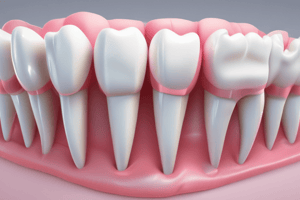Podcast
Questions and Answers
What is one of the key prevention strategies mentioned to help prevent dental caries?
What is one of the key prevention strategies mentioned to help prevent dental caries?
- Using fluoride products (correct)
- Chewing gum with sugar
- Consuming sugary snacks throughout the day
- Skipping regular dental check-ups
What is one of the effects of untreated dental caries on oral health?
What is one of the effects of untreated dental caries on oral health?
- Formation of abscesses (correct)
- Enhanced tooth enamel
- Increased risk of gum disease
- Reduced sensitivity to hot and cold
Which treatment option is used to save a tooth when the pulp becomes inflamed or infected?
Which treatment option is used to save a tooth when the pulp becomes inflamed or infected?
- Filling with silver amalgam
- Crowning the tooth
- Tooth extraction
- Root canal therapy (correct)
What is one risk factor that can increase the likelihood of developing dental caries?
What is one risk factor that can increase the likelihood of developing dental caries?
Which strategy is NOT recommended as a prevention method for dental caries?
Which strategy is NOT recommended as a prevention method for dental caries?
What is the primary cause of dental caries?
What is the primary cause of dental caries?
Which of the following bacteria are responsible for converting fermentable carbohydrates into acids that cause dental caries?
Which of the following bacteria are responsible for converting fermentable carbohydrates into acids that cause dental caries?
Which of the following is an effective method for preventing dental caries?
Which of the following is an effective method for preventing dental caries?
What is the primary effect of untreated dental caries on oral health?
What is the primary effect of untreated dental caries on oral health?
Which of the following is considered a risk factor for developing dental caries?
Which of the following is considered a risk factor for developing dental caries?
Flashcards are hidden until you start studying
Study Notes
Dental Caries: Understanding Its Causes, Prevention, Effects, Treatments, and Risk Factors
Introduction
Dental caries, commonly known as tooth decay, is an infectious disease affecting the teeth and oral tissues. It arises from the interaction between the tooth itself, the oral microorganisms living on and within the tooth, and dietary sugars. Dental caries is a significant global health issue that affects millions of people, particularly those in lower socio-economic classes. Despite advancements in scientific understanding and available treatments, dental caries remains a complex condition that requires ongoing research and prevention strategies.
Causes of Dental Caries
Dental caries is primarily caused by the breakdown of tooth enamel and dentin, leading to tooth decay. This process begins with the presence of fermentable carbohydrates in the mouth, such as glucose, fructose, and sucrose. Fermentable carbohydrates feed certain types of bacteria, specifically Streptococcus mutans and Lactobacillus, which convert them into acids via fermentation. These acids lower the pH of the mouth, creating an acidic environment that dissolves the mineral content of tooth enamel.
Prevention Methods
Preventing dental caries involves addressing the root causes and implementing protective measures. Some key prevention strategies include maintaining good oral hygiene, limiting sugar intake, using fluoride products, applying pit and fissure sealants, consuming xylitol, and promoting healthy diets:
- Oral hygiene: Brush your teeth at least twice a day, floss regularly, and rinse with an alcohol-free mouthwash to remove bacterial plaque, which contributes to tooth decay.
- Fluoride application: Fluoride helps strengthen tooth enamel and protect against tooth decay. Common sources of fluoride include tap water, toothpaste, mouthwash, and professional applications like gels and varnishes.
- Pit and fissure sealants: These protect the grooves and indentations on tooth surfaces, where bacteria tend to accumulate.
- Xylitol: This natural sweetener has been shown to slow tooth decay by disrupting bacteria's ability to bind to teeth.
- Healthy diets: Limiting sugar intake and choosing nutrient-rich foods can help prevent tooth decay.
Effects on Oral Health
If left untreated, dental caries can lead to several negative consequences on oral health:
- Toothache: Inflammation and infection of the pulp tissue within the tooth can cause severe pain.
- Abscess formation: Advanced tooth decay may lead to abscesses, pockets of pus containing infected tissue and bacteria, which can spread and cause further complications.
- Dental caries-associated risk factors: Poor oral health has been linked to various systemic diseases, such as endocarditis, respiratory infections, diabetes, cardiovascular disease, stroke, rheumatoid arthritis, and osteoporosis.
Treatment Options
For cases where dental caries has already occurred, various treatment options are available, ranging from minimally invasive procedures to tooth extraction:
- Restorative therapy: Fillings, inlays, onlays, and crowns are used to repair damaged teeth.
- Root canal therapy: When the pulp of a tooth becomes inflamed or infected, root canal therapy can be performed to save the tooth.
- Tooth extraction: If a tooth is severely decayed or cannot be saved, extraction may be necessary.
Risk Factors
Several factors increase the likelihood of developing dental caries:
- Poor oral hygiene: Inadequate tooth brushing, flossing, and mouthwashing can allow plaque buildup.
- High sugar consumption: Consuming large amounts of sugar provides fuel for the bacteria responsible for tooth decay.
- Economic status: People from lower socio-economic backgrounds have limited access to dental care and education about oral health.
- Genetic predisposition: Certain genetic traits may make some individuals more susceptible to tooth decay.
Studying That Suits You
Use AI to generate personalized quizzes and flashcards to suit your learning preferences.




